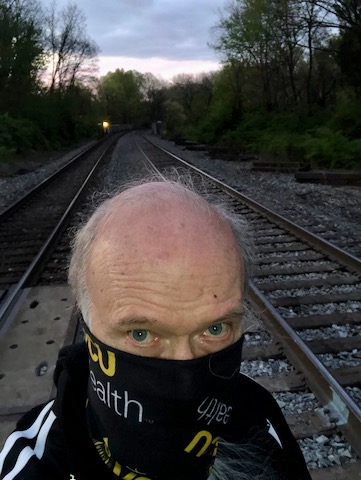

Howdy, pilgrim! No ads — you're in the ^zhurnal (that's Russian for "journal") — see ZhurnalyWiki for a Wiki edition of individual items; see Zhurnal and Zhurnaly for quick clues as to what this is all about; see Random for a random page. Briefly, this is the diary of ^z = Mark Zimmermann ... previous volume = 0.9940 ... complete list at bottom of page ... send comments & suggestions to "z (at) his (dot) com" ... click on a title link to go to that item in the ZhurnalyWiki where you can edit or comment on it ... thank you!
 | "... 'Cause out on the edge of darkness / There rides a peace train. ...". Azaleas/rhododendrons sway in the breeze. |
| Graffiti decorates the piers supporting Linden Lane. The railroad bridge over the Capital Beltway is wide. Roadkill startles a scrawny red fox that scampers across the tracks and dives into the brush. |  |
- Thursday, June 04, 2020 at 06:10:09 (EDT)
Rat-a-tat! Red-crested woodpecker plays percussion on the downspout, climbs the chimney, and flits away. Roadkill shambles around the neighborhood, visits the historic graveyard at St John the Evangelist church, and crawls home. Marian statues offer compassion and hope.
- Wednesday, June 03, 2020 at 05:34:34 (EDT)
A joyous thought from the 1920 silent film "Pollyanna" starring Mary Pickford:
| "I'm glad — I had so much fun — on my legs — while they lasted." |
(cf Thank Goodness (2002-12-25), Mister Pollyanna (2020-01-28), ...)
- Tuesday, June 02, 2020 at 06:34:13 (EDT)
 | Little loop about the 'hood turns up nice new yard art on a side street — a lawn puppy, a faux flower, a concrete head, ... |
| ... and a peaceful barefoot statue on the edge of the woods. Roadkill peeks out through ferns and roses ... |  |
- Monday, June 01, 2020 at 06:09:43 (EDT)
| Some people say they stand on the shoulders of giants. Even though I'm not a giant, just to be safe, I grease my shoulders! |
(cf Comments on Research and Life in which Richard Hamming of Bell Labs says, "[Newton] notes, 'If I have seen further than others, it is because I've stood on the shoulders of giants.' These days we stand on each other's feet!")
- Sunday, May 31, 2020 at 05:53:46 (EDT)
 | New cut-through! Roadkill explores a cul-de-sac and finds a gate in the wooden fence between neighborhoods. Birds chirp at the sunrise as a large gray fox glides across the street. The old knee aches less on climbs than during descents. Bearded irises bring to mind the poem "My Mother's Pansies" by Sharon Olds. |
- Saturday, May 30, 2020 at 06:51:50 (EDT)
Robert Lewis Stevenson and his son Lloyd Osbourne's 1889 comic novel The Wrong Box paints a hilarious portrait of pedantic Joseph Finsbury. From Chapter 1:
... A taste for general information, not promptly checked, had soon begun to sap his manhood. There is no passion more debilitating to the mind, unless, perhaps, it be that itch of public speaking which it not infrequently accompanies or begets. The two were conjoined in the case of Joseph; the acute stage of this double malady, that in which the patient delivers gratuitous lectures, soon declared itself with severity, and not many years had passed over his head before he would have travelled thirty miles to address an infant school. He was no student; his reading was confined to elementary textbooks and the daily papers; he did not even fly as high as cyclopedias; life, he would say, was his volume. His lectures were not meant, he would declare, for college professors; they were addressed direct to 'the great heart of the people', and the heart of the people must certainly be sounder than its head, for his lucubrations were received with favour. That entitled 'How to Live Cheerfully on Forty Pounds a Year', created a sensation among the unemployed. 'Education: Its Aims, Objects, Purposes, and Desirability', gained him the respect of the shallow-minded. As for his celebrated essay on 'Life Insurance Regarded in its Relation to the Masses', read before the Working Men's Mutual Improvement Society, Isle of Dogs, it was received with a 'literal ovation' by an unintelligent audience of both sexes, and so marked was the effect that he was next year elected honorary president of the institution, an office of less than no emolument — since the holder was expected to come down with a donation — but one which highly satisfied his self-esteem. ...
... and in Chapter IX his nephew Michael is an audience:
... But this was Michael's last interruption. He listened in good-humoured silence to the remainder of his uncle's lecture, which speedily branched to political reform, thence to the theory of the weather-glass, with an illustrative account of a bora in the Adriatic; thence again to the best manner of teaching arithmetic to the deaf-and-dumb; and with that, the sandwich being then no more, explicuit valde feliciter. ...
(cf Technical Minded (2003-07-18), Mr. Know-It-All (2008-03-08), ...)
- Friday, May 29, 2020 at 06:45:28 (EDT)
 | "A Cat Practice" say signs at the veterinarian's office. "Nice tights!" Roadkill remarks, as a runner passes by. A goofy bug-bowl mini-sculpture perches atop a stump. |
| Painted rocks and rainbow-pony toys decorate front porches. The Forest Glen Seminary pagoda is all angles against the dawn sky. |  |
- Thursday, May 28, 2020 at 06:54:18 (EDT)
"At the Back of the North Wind" , a children's fantasy novel by George Macdonald (1871), wrestles with philosophical-religious issues of good and evil, kindness and hatred. Already in Chapter I, for example, when the central characters (Diamond, a young boy, and North Wind, a personified force of Nature) meet:
"Well, please, North Wind, you are so beautiful, I am quite ready to go with you."
"You must not be ready to go with everything beautiful all at once, Diamond."
"But what's beautiful can't be bad. You're not bad, North Wind?"
"No; I'm not bad. But sometimes beautiful things grow bad by doing bad, and it takes some time for their badness to spoil their beauty. So little boys may be mistaken if they go after things because they are beautiful."
"Well, I will go with you because you are beautiful and good, too."
"Ah, but there's another thing, Diamond:–What if I should look ugly without being bad–look ugly myself because I am making ugly things beautiful?–What then?"
"I don't quite understand you, North Wind. You tell me what then."
"Well, I will tell you. If you see me with my face all black, don't be frightened. If you see me flapping wings like a bat's, as big as the whole sky, don't be frightened. ..."
... more lovely-poetic excerpt-quotes to follow.
(cf The Ugly Fallacy (2003-12-07), Beautiful Virtue (2003-12-15), Foul Is Fair (2004-07-13), Ladder of Life (2005-04-10), Siddhartha (2009-08-24), ...)
- Wednesday, May 27, 2020 at 06:36:04 (EDT)
Whose Body? , the first Dorothy Sayers novel (1923), features rich-twit-detective Lord Peter Wimsey. It seems at first a parody — alas, it's not. But amidst unconscious racism and class-conceit there are occasional gems, e.g., in Chapter IV:
... "The deuce you have–what an energetic devil you are! I say, Parker, I think this co-operative scheme is an uncommonly good one. It's much easier to work on someone else's job than one's own–gives one that delightful feelin' of interferin' and bossin' about, combined with the glorious sensation that another fellow is takin' all one's own work off one's hands. You scratch my back and I'll scratch yours, what? Did you find anything?" ...
and in Chapter VIII, a brilliant image when the puzzle is solved:
... And then it happened–the thing he had been half-unconsciously expecting. It happened suddenly, surely, as unmistakably, as sunrise. He remembered–not one thing, nor another thing, nor a logical succession of things, but everything–the whole thing, perfect, complete, in all its dimensions as it were and instantaneously; as if he stood outside the world and saw it suspended in infinitely dimensional space. He no longer needed to reason about it, or even to think about it. He knew it. ...
- Monday, May 25, 2020 at 07:08:00 (EDT)
 | Cars roll through stop signs, then slam on their brakes to creep past speed cameras. Lawn statues commemorate the debate between feline fanciers and canine cravers. |
| Bearded irises curl in the morning cold to cover their naughty bits. Roadkill pauses to pose for selfies and strives to extend his gimpy-legged stride in a sunrise shamble about the 'hood. |  |
- Sunday, May 24, 2020 at 09:37:21 (EDT)
Kynde and gentil thoughtes on Twitter? "Chaucer Doth Tweet" is a rare example. On 13 May 2020:
| Worrye nat about being productyve, for thou art not a product. Thou art a star daunsinge yn a forest, and, to speake full plainlye, stuffe ys reallye weirde righte nowe. Whatevir ye dyd todaye ys ynough. |
... and on 20 May 2020: "Vampyres are awesome by cause lyke ninetye percente of their poweres are avoidinge people and escapinge quicklye from awkwarde social situaciouns." Yes-yes-yes! And this poll on 23 May 2020:
| Ye kan pick onlye three: * stayinge healthye * good werke lyfe * solid relaciounshippes * mightye and ancient, surrounded by a column of crowes yn the forest, readye for the great mysteryes |
... so tough, once the obvious first choice of Crowes is made!
(cf Valentine's Day 2009 (2009-02-14), Great Vowel Shift (2009-02-18), ...)
- Saturday, May 23, 2020 at 06:45:28 (EDT)
Cliché o' the Day: "... coined the term ..." — what a slender reed on which to base a claim of fame! Just because somebody is first to say a phrase that catches on doesn't mean they are a deep thinker, or that somebody else didn't do the hard work. The same end-state might have been reached entirely without their slogan. Beware celebrity promo, especially by wordsmith biographers.
- Friday, May 22, 2020 at 19:50:48 (EDT)
Meaning is a complex concept. So is Work . The 2017 Harvard Business Review article by John Coleman, "To Find Meaning in Your Work, Change How You Think About It", begins with a description of competition among sewage treatment employees: "It's tough work. It's frequently unpleasant work. And they're terrific at it." The essay explores four paths to purpose and suggests, "Working with a sense of purpose day-in and day-out is an act of will that takes thoughtfulness and practice." Those paths:
(cf Just the Job (1999-12-04), Helpful Homilies (2007-09-02), Get to Work (2010-08-23), Work vs. Personal Freedom (2011-09-12), Parachute Color (2011-12-06), Right Attitude (2013-08-03), Work as Practice (2014-09-05), Nine Beliefs for Success (2018-03-02), Good Job (2019-03-12), ...)
- Thursday, May 21, 2020 at 05:34:20 (EDT)
 | Cardinals flit past azaleas, competing in their hues of pink and scarlet, blush and crimson. Front-yard statues under brick archways bless passers-by. A construction-zone cut-through muddies shoes. Roadkill's knee twinges to remind him that healing takes time (or maybe more mileage?). Shades of Sagittarius: trackfile map forms a teapot shape. |  |
- Tuesday, May 19, 2020 at 05:55:19 (EDT)
Agatha Christie's 1926 detective novel The Murder of Roger Ackroyd is famous for an amazing plot twist; with that unmentionable out of the way, it also offer some cute British slang. In Chapter 2 there's "on the tapis" (= "under consideration" — a "tapis" is a tapestry) and in Chapter 6 "rather the Tartar" (= a bossy, rough, violent, or irritable person). There are also a few delightful Hercule Poirot-isms. In Chapter 7, for example
"It is completely unimportant," said Poirot. "That is why it is so interesting," he added softly.
and in Chapter 8, this exchange:
"If those walls could speak," I murmured.
Poirot shook his head.
"A tongue is not enough," he said. "They would have to have also eyes and ears. But do not be too sure that these dead things"–he touched the top of the bookcase as he spoke–"are always dumb. To me they speak sometimes–chairs, tables–they have their message!"
He turned away towards the door.
"What message?" I cried. "What have they said to you today?"
He looked over his shoulder and raised one eyebrow quizzically.
"An opened window," he said. "A locked door. A chair that apparently moved itself. To all three I say 'Why?' and I find no answer."
The ending? A bit less interesting than the journey ...
- Monday, May 18, 2020 at 06:18:23 (EDT)
Too pedestrian a translation? Too weak a reader? Too complex a story for the writer? Whatever the reason(s), Secondhand Time by Svetlana Alexiyevich tastes like a cake with insufficiently-mixed ingredients. It's a collection of commentary from 1991-2012, after the breakdown of the Soviet Union. Much deep bitterness, some happy humor, many likely lies. A sampler:
Alexiyevich makes mosaics with lovely stones but — unlike Aleksandr Solzhenitsyn — they don't seem to form a coherent image when one steps back. Or in Category Theory symbolism, A → B , maybe the problem is within the A, or the B , or the arrow → ...
(cf Great Writers (2003-01-02), Arkhipelag Gulag (2008-08-04), ...)
- Sunday, May 17, 2020 at 06:38:11 (EDT)
Roadkill discovers that sipping coffee under a mask makes a soggy mustache. Dandelions blossom and happy birds chirp in preparation for dawn. Low in the east a waning Moon slides below Mars while Saturn and Jupiter lead the way. Coffee table architecture books dominate the front window of a big little free library.
- Friday, May 15, 2020 at 06:05:45 (EDT)
"Out of an abundance of caution ..." — a phrase that occurs more often in recent times than ever before — is code-language for either:
or:
- Wednesday, May 13, 2020 at 05:33:55 (EDT)
From Hyperbole and a Half a decade ago, in "Alot Is Better than You at Everything":
... If I come across a person who seems to completely ignore the existence of apostrophes and capital letters and types things like "im an eagle and im typing with my talons, so dont make fun of me cuz this is hard," I like to imagine that they actually are an eagle typing with their talons. It would be a hassle if you had to hop in the air and use your feet to karate-chop two keys simultaneously every time you wanted to use the shift key to make a capital letter. Also, eagles lack manual dexterity, so I can understand why they'd want to leave out apostrophes. Eagles are all about efficiency.
... in other words, Be Tolerant of others, assume positive intent, avoid the Fundamental Attribution Error, and remember that there's likely far more going on than meets the eye ...
(cf Cardinal Newman (2001-10-04), Big Biases (2014-01-09), ...)
- Tuesday, May 12, 2020 at 05:46:28 (EDT)
Dr Valerie Gawron's autobiographical collection of anecdotes, Stories of My Life, is by turns frank and funny, nice and (a wee bit) naughty — and always loving, despite tragedies that she and her friends faced. A small cheerful sample of "One Liners", from her parents and herself:
... happy moments and sad — a life full of blessings.
- Monday, May 11, 2020 at 06:06:39 (EDT)
Wise fragment from recent chat with a BFF who survived:
| No Worries. I'm alive. I was vain before. This makes me much more focused on what matters. |
(cf UniversalFlourishing (2001-12-25]], Habitual Virtue (2008-12-18), This Is Water (2009-05-21), Ground of Being (2013-10-03), It is Thou (2014-09-24), Veil of Separation (2015-10-14), ...)
- Sunday, May 10, 2020 at 06:25:43 (EDT)
 |
From the 14 February 1994 "Calvin and Hobbes" by Bill Watterson:
(cf Simple Answers (1999-05-04), ...)
- Saturday, May 09, 2020 at 18:24:01 (EDT)
A friend (B-ff) posts a link to the 2007 Harvard Business Review article "Manage Your Energy, Not Your Time" — which suggests the physics metaphor-map that, since Energy is the timelike component of the Energy-Momentum 4-vector:
| "Manage which Way You're Going — Don't Worry about Where You Are!" |
(cf Kenning Construction Kit (1999-11-17), Meta-Analogy (2013-03-20), Quads (2019-04-18), ...)
- Thursday, May 07, 2020 at 07:09:01 (EDT)
"All abstractions are leaky!" — a nice explanation of what mathematical Category Theory focuses on, by "eli_gottlieb" = Eli Sennesh in a recent Hacker News thread:
Every branch of mathematics formalizes and studies some underlying phenomena. For example, in calculus, it's rates of change: their division into instantaneous changes (derivatives) and their accumulation into changes over time or space (integrals). In topology, it's properties like continuity and connectedness.
Of course, all mathematics is abstraction, and all abstractions are leaky. Calculus just chooses not to study non-differentiable and non-integrable functions. Topology chooses not to study discontinuous transformations, and abstracts away the spatial metric.
In category theory, the property under study is compositionality: the property that given a path from A->B, and another from B->C, you have a path A->C. Of course, anyone who's ever written a computer program knows that this is not as guaranteed as it sounds. All abstractions are leaky, and if your "paths" are functions, in the programming sense, then the second one could throw an exception, leaving you high and dry with the intuitive transitive property being straight-up wrong. Likewise, if your "paths" are mathematical functions, composition can preserve continuity (f . g for continuous f and g is continuous), but if either one is discontinuous, the result will fail to be continuous.
So category theory abstracts away the "exceptions" and "discontinuities" by ruling them illegal: in a category of topological spaces and continuous functions, everything, by construction, preserves continuity. We thus have an entire field of mathematics devoted to asking and answering the question: "what sorts of properties are preserved under transitive composition in what sorts of settings?"
(cf Greatest Inventions (2011-06-09), Cakes, Custard, and Category Theory (2016-02-14), Put the Vast Storehouse in Order (2017-10-04), ...)
- Wednesday, May 06, 2020 at 06:17:00 (EDT)
Harvard professor Arthur C Brooks in a recent essay "How to Build a Life" suggests some semi-quantitative relationships among key factors in a successful human life:
| Subjective Well-Being = Genes + Circumstances + Habits |
"... the genetic component of a person's well-being is between 44 percent and 52 percent, that is, about half. The other two components are your circumstances and your habits. Research is all over the map on what percentage each part represents. Circumstances–the good and the bad that enter all of our lives–could make up as little as 10 percent or as much as 40 percent of your subjective well-being. ..."
| Habits = Faith + Family + Friends + Work |
"... Enduring happiness comes from human relationships, productive work, and the transcendental elements of life. ..."
| Satisfaction = What You Have / What You Want |
"... The secret to satisfaction is to focus on the denominator of Equation 3. Don't obsess about your haves; manage your wants, instead. Don't count your possessions (or your money, power, prestige, romantic partners, or fame) and try to figure out how to increase them; make an inventory of your worldly desires and try to decrease them. Make a bucket list–but not of exotic vacations and expensive stuff. Make a list of the attachments in your life you need to discard. Then, make a plan to do just that. The fewer wants there are screaming inside your brain and dividing your attention, the more peace and satisfaction will be left for what you already have. ..."
(cf Basement Worries (2002-06-15), Social Wealth (2005-05-18), ...)
- Sunday, May 03, 2020 at 07:31:42 (EDT)
| On Mimzy's birthday she awoke Standing under her favorite tree. She flicked her tail and tossed her head Dislodging leaves that she could see Had fallen on her rainbow hair, Perhaps between midnight and three. She looked around, quite puzzled that Her family was not in sight. The forest twittered as the birds Chirped at each other and took flight. Then branches swayed, and rising gusts Of wind brought clouds that dimmed the light. "A storm!" thought Mimzy, and recalled A cavern not too far away To which the unicorns would go, A shelter in which they could stay All warm and dry and comfortable In winter when the skies turned gray. So cautiously she took the path, Entered the cave, then stopped in fear. A fire flickered, shadows loomed. "Oh no!" she sensed. "There's someone near!" She turned to flee. "Please wait," she heard A voice say, "You're much safer here!" A flash of lightning lit the room And thunder boomed as from behind The flames there stepped a woman. "Call "Me Miriam," she said, "and mind Your horn — the ceiling's rather low!" She smiled and said, "I think you'll find" "Your party's in the cave next-door. Your parents sent me, since they knew You'd get here just in time. They asked For me to give you this tutu To wear, and help you braid your mane. Let's sprinkle on some glitter too!" And so the Lady Miriam Applied her magic, and when she Was done, the happy unicorn Glowed in a beauty all could see. Guests opened presents, danced, ate cake, And sang, "Happy Birthday, Mimzy!" Then Mimzy curtsied, thanked her friends, And winked at Lady Miriam. |
(for B-ff's daughter whose birthday was earlier this week)
- Saturday, May 02, 2020 at 05:40:09 (EDT)
A fascinating discussion, from 2009, about why some kinds of thoughts (and some kinds of math) seem more "natural" than others — Stephen Harris writes in the n-Category Café:
I guess I lean to the position (really a truism) that so much of mathematics as we know it is dictated by the way humans are wired — the way in which cognitive processes are rooted in vision and in physical actions, and driven by emotional needs, that it seems much safer to me to suppose these sorts of imbalances are due to human habits or characteristics. In other words, if computers were one day to do independent mathematical research, they might explore all sorts of possibilities which would seem very strange or would never occur to us, and redress some of the apparent imbalances.
John Baez responds:
... living in a world where the future and past are so drastically different, people are bound to come up with math that has this asymmetry built in.
... Part of my reasons is that language, from which many higher mental functions seem to be evolved, can cope with resolving quite deep "stacks" of definite elements but are very poor at resolving much less deep "stacks" which involve tracking multiple different possibilities at each level. ...I agree, but I again see the arrow of time here. We need to predict the future much more than we need to postdict the past. Why? Because we want to keep on surviving in the future, not the past. Why? It's an arrow of time thing.
So, trees of possibilities that branch forwards in the future are more worrisome than trees that branch backwards into the past. So, we find it very nice when a cause has just one possible effect: it simplifies our life. We don't care as much whether an effect has just one possible cause — unless we're doing a little piece of detective work, or history.
In short, we don't need to think about physics explicitly to develop a preference for functions over cofunctions: the physics of the world we live in almost guarantees it.
On the contrary, it's only when we start thinking about physics explicitly that we notice that the laws are time-symmetric, or nearly so, and we start developing an interest in categories that are self-dual. First the additive group of real numbers: the time line, which stretches symmetrically in both directions. Then the concept of groups, where every element has an inverse. Then the idea that time evolution is a symmetry, i.e. the action of a group. Then the development of matrix mechanics, where every operator has an adjoint. Then the realization that dagger-categories are important in physics, and the idea of 'reversible computing'.
and Todd Trimble notes:
I like John's arrow-of-time or entropy idea, where in favoring many-to-one relations (functions), we are just doing the normal human thing, putting different things into one box [which may be a physical box, like this morning when I was picking up my kids' toys, or a mental box, i.e., an abstraction], and thus disregarding or losing information or distinctions which we deem irrelevant or unimportant for the time being. It may be superfluous to give examples, but one of the first that comes to mind is putting all fractions that represent the same rational number together in a box: 2/6 and 1/3 are for all intents and purposes regarded as the same.
Decategorification is a kind of normal human act where we identify (and forget) by way of abstracting. Categorification can be seen as an act of remembering where the abstractions originally came from.
It may seem as though words like entropy, losing information, forgetting, and decategorifying are being used here as pejoratives, but of course I don't mean that: life, and science in particular, would be impossible without such basic maneuvers. There's that haunting short story by Borges, "Funes the Memorious", where a young Uruguayan savant gets thrown off a horse and is in a coma for a few days; when he comes to, he is physically paralyzed but endowed with an infallible memory. He can retrieve, with perfect fidelity, anything he has ever seen, heard, felt, thought, etc., down to the most minute detail ...
(cf Greatest Inventions (2011-06-09), Simplicity via Abstraction (2016-01-07), Cakes, Custard, and Category Theory (2016-02-14), Category Theory Concepts (2016-04-25), Bird's-Eye View (2016-07-20), Category Theory for Programmers (2017-05-12), Ultimate Abstraction (2017-08-24), Put the Vast Storehouse in Order (2017-10-04), Category Theory is like a Lighthouse (2018-12-24), Macro vs Micro (2019-02-03), Why Care about Category Theory (2019-03-03), ...)
- Friday, May 01, 2020 at 06:10:45 (EDT)
Great wisdom in Ross Douthat's April 2014 essay "The Pandemic and the Will of God", subtitled, "The purpose of suffering may be mysterious, but the search for meaning is obligatory" — especially in the observation:
... Because we are not Jesus, it is a very bad idea to walk around telling strangers how their suffering might display the works of God. But as friends, we can participate in others' discernment and pattern-seeking, and we can try to discern purposes in our own life — suffering as punishment, suffering as refinement, suffering as a judgment on a nation or society, suffering as an opportunity, suffering as part of a story not our own. ...
... especially in "suffering as an opportunity"!
(cf Softening into Experience (2012-11-12), Mindfulness for Beginners (2013-07-18), Four Mantras (2014-06-26), Buddhism and Suffering (2015-01-18), Edgeless Sea of Compassion (2015-10-10), Mantra - Don't Be the Fixer (2017-01-19), Mantra - Forgiven (2016-08-02), ...)
- Tuesday, April 28, 2020 at 07:25:15 (EDT)
| Both cats and chocolate confer The gift of meaning to our life Upon this Earth. A cat can purr And nuggle, cuzzle, prawl, and prance Across a keyboard, on a lap, Breathe gently in one's face and then, Obliviously blissful, tap The wellsprings of a heart in need. A cat brings joy and laughter, warmth, Adds typographic errors that Confuse, bemuse, or may improve. Cat cares not. And similarly, chocolate grants A blissful tickle to the tongue A sweet explosion, bitter-edged With alkaline nuances, notes Of psychoactive chemicals To kiss a brainstem, tweak a mood, Align the hypothalamus Toward a reward of joy and calm, A self-care bar of mindfulness. Some say there is no paradise — Though chocolate with a cat nearby Comes close! |
(for Brigitta, noodge & muse — Happy Birthday!)
- Monday, April 27, 2020 at 07:11:03 (EDT)
| Protected by cloudy facemasks, last-quarter Moon leads Jupiter, Saturn, and Mars on a Dawn Patrol ramble-meander stroll (with cane) around the 'hood. Gap in the fence at the industrial park tempts Roadkill — until a dog-bark suggests an invisible "No Trespassing" sign may be posted. |  |
- Saturday, April 25, 2020 at 11:21:35 (EDT)
Imagine a dialogue that extends across the centuries! As described by Mortimer Adler:
... What binds the authors together in an intellectual community is the great conversation in which they are engaged. In the works that come later in the sequence of years, we find authors listening to what their predecessors have had to say about this idea or that, this topic or that. They not only harken to the thought of their predecessors, they also respond to it by commenting on it in a variety of ways ...
(cf Ralph Waldo Emerson (2003-08-05), Vartan Gregorian on Libraries (2010-04-23), Commonplace Books (2010-05-10), All Minds Quote (2015-11-13), ...)
- Thursday, April 23, 2020 at 07:05:16 (EDT)
From Wikipedia's article "Big Lie", quoting from James Murphy's translation of Adolf Hitler's Mein Kampf (1925, vol. I, chap. X):
All this was inspired by the principle–which is quite true within itself–that in the big lie there is always a certain force of credibility; because the broad masses of a nation are always more easily corrupted in the deeper strata of their emotional nature than consciously or voluntarily; and thus in the primitive simplicity of their minds they more readily fall victims to the big lie than the small lie, since they themselves often tell small lies in little matters but would be ashamed to resort to large-scale falsehoods. It would never come into their heads to fabricate colossal untruths, and they would not believe that others could have the impudence to distort the truth so infamously. Even though the facts which prove this to be so may be brought clearly to their minds, they will still doubt and waver and will continue to think that there may be some other explanation. For the grossly impudent lie always leaves traces behind it, even after it has been nailed down, a fact which is known to all expert liars in this world and to all who conspire together in the art of lying.
(cf Spectrum of Deceit (2008-09-27), Lying (2011-11-13), ...)
- Wednesday, April 22, 2020 at 07:14:40 (EDT)
From a deep Christian perspective — that applies for those of any other, or no, faith — Peter Wehner writes on Good Friday (10 April 2020) in "How Should Christians Act During a Pandemic?" (aptly subtitled "I feel like I'm handing out life jackets of hope in a sea of despair."):
... If Christians are wise, we will emerge from this pandemic as different and better people: more kind and generous, more able to mourn with those who mourn, more able to model how love can cast out fear. "There is always reason to hope," the priest and author Henri Nouwen wrote, "even when your eyes are filled with tears." ...
... The hope of what awaits transforms the experience of waiting. But waiting isn't always easy. We live in a broken world, and there are moments when darkness feels like our closest friend.
(cf My Business (1999-05-30), Thank Goodness (2002-12-25), 2008-03-23 - Sunrise Service at Seneca Creek, Nothing Here (2016-11-21), 2019-04-21 - You Are Loved, Exactly as You Are (2020-01-31), ...)
- Monday, April 20, 2020 at 06:25:27 (EDT)
| I bake my wedding cake the day before We say our marriage vows. Our daughters stir The batter, oil the pans, and help me pour Red velvet into them. We slide the racks In place, preheat the oven, open door, And smile into the warmth. So life begins, As two souls join together, making more. Magic ensues: the kitchen overflows With sweet aroma. Soon a timer chimes And toothpick tests confirm what the nose knows. On wire grids the layers cool, and meanwhile With sugar, butter, cream cheese we compose The icing. Then assemble, frost, and crown — Our sons provide the groom and bride, Legos! How can this mere confection symbolize The central celebration of the World, The axis around which revolve our lives? Two people become one; two hearts unite. We lift each other up, and as we rise Converge upon the holy. God's great gift Is love, and matrimony is the prize. We say, "I do." — We kiss. — We hug. — We take — One breath, and then we share the perfect cake. |
(for G+S+s+N+g+n!)
- Sunday, April 19, 2020 at 06:42:50 (EDT)
Beautiful thoughts from "The Clarity That Comes With Hard Times" by Margaret Renkl in the 13 April 2020 NYT, reformatted as a prose-poem:
| ... that life is precious and finite, that we cannot know when the end is coming, that what is beautiful and just and true deserves our focus far more than what's annoying or inconvenient ... |
(cf Mantra - Give Instead of Giving Up (2020-02-25), ...)
- Thursday, April 16, 2020 at 06:33:23 (EDT)
 | Roadkill is back, doing a pink-dawn survey of the 'hood, with cane and knee brace and mask. Only one other walker is out, with her white Samoyed-ish dog waving its feather-duster tail ... |
- Tuesday, April 14, 2020 at 05:15:37 (EDT)
A beautiful foreground-background-inversion metaphor, from the essay "My Life Is More 'Disposable' During This Pandemic" by Elliot Kukla:
... Jewish mysticism holds that the letters of a Torah scroll are black fire on the white fire of the parchment. In this moment, we must find a way to make the spaces between us holy. In this pandemic it is the white fire that will hold our abundant love, our exquisite care, and our unwavering belief that each of our lives is worth saving. ...
(cf Poetry 180 (2009-09-30), Learning to Pause (2015-08-10), Work the Whitespace (2017-05-07), ...)
- Saturday, April 11, 2020 at 05:57:11 (EDT)
From the 2014 film "What We Did on Our Holiday" by Andy Hamilton and Guy Jenkin, great wisdom as an old man speaks quietly with his granddaughter:
Gordy: "You've heard of cancer. Well, I've got that."
Lottie: "But you will get better?"
Gordy: "Well, actually no. They can't make me any better. And the treatments they've been giving me have been putting a terrible strain on my heart. — <pauses> — But right now, right this second, I feel brilliant. — <pauses, as she writes something down> — What is this?"
Lottie: "It's my notebook."
Gordy: "You know, Lottie, a lot of life doesn't look very good written down."
... and a little later ...
Gordy: "Maybe your parents just lied to protect you."
Lottie: "Do you ever lie?"
Gordy: "I've told lots of lies. Lots and lots. And I always lied to policemen, who said, 'What speed were you going?' and I said '30 miles an hour' when i was clearly doing much faster than that. — <pauses> — And I don't care. — <laughs> — Sometimes, if your intentions are good, it's ok to lie."
Lottie: "If you don't like someone's food at someone's house, and you say, 'This is great,' even though ..."
Gordy: "That's what you do. You don't say, 'My God, I think I'm gonna vomit here!'"
Lottie: "What you're saying is, it's ok to lie to some people sometimes?"
Gordy: "Yeah. It's also good fun. For instance ..."
... and later still, on the beach ...
Lottie: "Mum and Dad lie so much. I just don't trust them any more. They make me so angry."
Gordy: "I used to feel like that with my lot too. Until I suddenly realized there was no point in being angry with people I loved for being what they are. ... The truth is, every human being on this planet is ridiculous in their own way. So we shouldn't judge and we shouldn't fight, because in the end — <sighs> — because in the end, none of it matters. None of this stuff."
(cf Wings of Acceptance (2015-05-26), Simple Mind (2015-09-16), Set Aside Judging (2017-02-17), Mantra - Be Meta, Be Open, Be Love (2018-11-11), ...)
- Sunday, April 05, 2020 at 15:06:39 (EDT)
From a review "Lives of the Novelists: E. M. Forster" by Colm Toibin in 2010:
... novels should not be honest. They are a pack of lies that are also a set of metaphors; because the lies and metaphors are chosen and offered shape and structure, they may indeed represent the self, or the play between the unconscious mind and the conscious will, but they are not forms of self-expression, or true confession. ...
Toibin mentions Wendy Moffat's biography A Great Unrecorded History: A New Life of E. M. Forster in which she observes of Forster ("Morgan" to his friends):
... To speak with Forster was to be seduced by an inverse charisma, a sense of being listened to with such intensity that you had to be your most honest, sharpest, and best self. Morgan's steadfast scrutiny tested his friends' nerves. Siegfried Sassoon found it "always makes me into a chatterbox." The attention made Christopher feel "false and tricky and embarrassed." He always had to suppress the urge to act the clown, to "amuse" Morgan to dispel the moral weight of his stillness and empathy. ...
(cf Lying Verses (2001-03-15), Howards End (2017-07-19), Room with a View (2017-08-20), Passage to India (2017-08-22), ...)
- Wednesday, April 01, 2020 at 07:36:16 (EDT)
Dear friend "S" reports a dialogue from a recent walk with her daughter "H", upon seeing chalk drawings on the sidewalk:
H: I am still mad at [somebody] from when he yelled at me for getting close to the Stop Line.
S: What? Is that even a thing? What Stop Line?
H: Yes, it's a thing. He yelled at me because I got close to the chalk line on the driveway that said STOP HERE. The line so that I would not go near the road.
Me: What?
H: Yeah, I was 6. Remember?
Me: Wow, way to hold a grudge — that was 10 years ago.
H: I'm not a quitter.
(conversation lightly edited for anonymity)
- Tuesday, March 31, 2020 at 08:12:33 (EDT)
From "Remembering Mr. Rogers", video interviews by Charlie Rose in 1994 and 1997, comments by Fred Rogers about emptiness and awareness and receiving:
(cf [1] and [2], 2018-09-10 - Thank You, Mr Rogers, Mr Rogers Asks (2019-11-18), Present in Every Moment (2019-11-25), 143 (2019-11-28), Receiving (2019-12-22), Just Tending Soil (2020-01-01), Listening (2020-01-17), ...)
- Monday, March 30, 2020 at 06:42:33 (EDT)
Thoughtful words by Peter Wehner in an essay in The Atlantic [1], about the requirements for leadership in crisis:
The qualities we most need in a president during this crisis are calmness, wisdom, and reassurance; a command of the facts and the ability to communicate them well; and the capacity to think about the medium and long term while carefully weighing competing options and conflicting needs. We need a leader who can persuade the public to act in ways that are difficult but necessary, who can focus like a laser beam on a problem for a sustained period of time, and who will listen to—and, when necessary, defer to—experts who know far more than he does. We need a president who can draw the nation together rather than drive it apart, who excels at the intricate work of governing, and who works well with elected officials at every level. We need a chief executive whose judgment is not just sound, but exceptional.
(cf Weight of Office (2000-11-30), Al Gore (2004-09-14), Christmas Strength and Weakness (2020-01-03), ...)
- Sunday, March 29, 2020 at 07:38:10 (EDT)
An image from the 2012 race report by Jaret Seiberg of the inaugural "Mogollon Monster 100", an impossibly-hard ultramarathon held near Pine Arizona:
... When race day came, there were only three of us at the starting line. Kerry opted to pace Doug at night rather than run the entire race. This once again confirms that Kerry is in fact the smartest person in the VHTRC. (Yes, I realize as we are a club that has members who milk venom out of snakes while on training runs that Kerry being the smartest in the VHTRC may be the equivalent of being the shortest giant or tallest midget, but it is still noteworthy.) ...
- Saturday, March 28, 2020 at 13:26:24 (EDT)
Stephanie Russell-Craft in "Mister Rogers and the Reformation of Tom Junod" (Columbia Journalism Review, Feb 2020) shares insights from Mr Junod about Fred Rogers:
Fred made me think about: Is God good? Does God love us? Is love the basis of creation?
Fred's answer to all three was a resounding yes, and he lived by that answer.
I was not so certain and am not so certain now. But Fred made me realize that if love can be at the center of human interactions—and there's no doubt it can be, because he proved it—then the possibility that there's not only a moral arc to the universe, but a loving one, is not as far-fetched.
... and ...
Fred showed me a lot of different things about religious practice. He definitely figured out a secular language for spiritual matters. That whole "you are special" thing—I look back on it now and it's very much a religious sentiment that he managed to couch in not just secular but childlike tropes.
Also, Fred was very Protestant. He was a Presbyterian minister. His relationship with God required no intermediaries. Fred's prayer was very direct.
(cf Face to Face with God (2001-11-13), 2018-09-10 - Thank You, Mr Rogers, Mr Rogers Asks (2019-11-18), Present in Every Moment (2019-11-25), Goodness Is Interesting (2020-03-07), ...)
- Wednesday, March 25, 2020 at 05:52:01 (EDT)
May I:
And everywhere and always, in everyone and everything: seek and love the Good!
(cf Optimist Creed (1999-04-16), Personless Mission Statement (2009-04-29), Mantra - Be Your Own Best Friend (2016-02-16), Mantra - Be on Good Form (2016-05-10), More Meta (2019-08-31), Mantra - Be More Meta (2020-01-02), Clearly, Dearly, Nearly (2020-02-05), ...)
- Sunday, March 22, 2020 at 12:30:32 (EDT)
| Like a bud exploding into a rose Like a calico cat awakening from a dream She rises to her feet Stretches her arms overhead Arches her back Spreads fingers, closes eyes Tips face up to the sky Inhales impossibly deep Without boundaries, inhibitions, fears, She expands into the universe Rises a-tiptoe for a moment Lowers, plants feet wide Shakes hair into A waterfall down her spine Then softly sighs Drops her shoulders Brings together hands In a momentary namaste Before letting them fall to her sides She opens her eyes and shrinks Origami-ing into a person. |
- Saturday, March 21, 2020 at 10:39:34 (EDT)
| A circle grows and spreads Like a fairy ring of mushrooms Like ripples on a mirror-pond Like a thunderous shock wave From a single act of kindness One loving deed, one heart's touch Passes to the next person, and the next Expanding and cascading Until it circles the Earth Converges at antipodes Echoes, reflects, and returns To heal the broken one who started it |
- Friday, March 20, 2020 at 04:33:49 (EDT)
| Exercise bicycle generates heat: Pedaling in place, going nowhere, Hum of the bearings and sweat on the seat, Single wheel spins, fan moves the air. Elderly couple complains of the news, Reciting arguments from bygone years, Shopworn decisions and ossified views, Both people speaking, neither one hears. |
- Wednesday, March 18, 2020 at 17:28:17 (EDT)
Michael Leavitt, EPA Administrator and Secretary of HHS under the George W. Bush administration, said in June 2007:
| "Everything we do before a pandemic will seem alarmist. Everything we do after a pandemic will seem inadequate." |
(cf [1], Deadly Feasts (2008-08-21), ...)
- Monday, March 16, 2020 at 06:30:00 (EDT)
Important reminders in The Limits to Growth: The 30-Year Update concerning crucial non-physical factors that are often overlooked in modeling global systems and the future of civilization:
"... the actual growth of the economy and the population will depend on such factors as peace and social stability, equity and personal security, honest and far sighted leaders, education and openness to new ideas, willingness to admit mistakes and to experiment, and the institutional foundations for steady and appropriate technical progress ..."
(cf Silent Spring (2010-01-14), Forecasting Lessons from Systems Dynamics (2017-07-05), Thinking in Systems (2017-11-03), Dancing with Systems (2019-06-21), Systems Thinking Icebergs (2019-06-27), Insight Modeling (2019-12-31), ...)
- Sunday, March 15, 2020 at 07:07:55 (EDT)
Said in 1852 by the Duke of Wellington:
| All the business of war, and indeed all the business of life, is to endeavour to find out what you don't know by what you do; that's what I called "guessing what was at the other side of the hill." |
(cf Excremental Typo (2004-09-03), Mantra - Give More Praise (2019-07-28), ...)
- Friday, March 13, 2020 at 10:45:25 (EDT)
Fred Rogers quotes from The World According to Mister Rogers: Important Things to Remember:
Forgiveness is a strange thing. It can sometimes be easier to forgive our enemies than our friends. It can be hardest of all to forgive people we love. Like all of life's important coping skills, the ability to forgive and the capacity to let go of resentments most likely take root very early in our lives.
and
In the external scheme of things, shining moments are as brief as the twinkling of an eye, yet such twinklings are what eternity is made of — moments when we human beings can say "I love you", "I'm proud of you", "I forgive you", "I'm grateful for you". That's what eternity is made of: invisible, imperishable good stuff.
and
Love is like infinity: you can't have more or less infinity, and you can't compare two things to see if they're "equally infinite". Infinity just is, and that's the way I think love is, too.
and
When I think of solitude, I think of an anecdote from With the Door Open: My Experience by the late Danish religious philosopher Johannes Anker Larsen: "The most comprehensive formula for human culture which I know was given by the old peasant who, on his death bed, obtained from his son this one promise: to sit every day for half an hour alone in the best room."
(cf 2018-09-10 - Thank You, Mr Rogers, Mr Rogers Asks (2019-11-18), Present in Every Moment (2019-11-25), 143 (2019-11-28), ...)
- Thursday, March 12, 2020 at 06:34:11 (EDT)
Scott Fauble, elite marathon runner, handled disappointment (a twelfth-place finish at the US Olympic Trials on 29 Feb 2020) with awesome grace and humor:
... I guess I could spend the next paragraph or two writing a high minded analysis about tactical mistakes and missed training and maybe those things would be true. Maybe they'd be excuses, I don't know. I'm not gonna do that, however, because if I were on the other side of the screen then I wouldn't want to read that. What I do want to say is, 1) Thank you. Thank you to way more people than I can name here, and probably more people than I deserve to have in my corner. I love you guys. 2) There will be another opportunity. I double checked this morning and, as it turns out, there will be more races. I don't know exactly what our next steps are from here, but I'm excited and enthusiastic for this journey to continue. 3) we're sending some wonderful people and athletes to Tokyo. Obviously Aliphine is an absolute queen and I could write 7 gazillion words about her kindness and toughness. She'll be joined by two amazing competitors in Jake Reilly – who absolutely earned that spot and I'm so happy for him – he deserves this. And Molly Seidel, who has always been overwhelmingly positive whenever we've been able to grab a few miles together over the last few years. I have a feeling that better story tellers than I will be sharing their journeys in the next few months.
Thanks for being here, you guys.
Scott is also the founder of the Burrito Mafia. In November 2017 he explained in a Citius Magazine essay:
... the ontological certainty that Mexican food is something that, by some beautiful theological mistake, fell directly from heaven and into the hands of a few blessed individuals who have passed their secrets down and helped Mexican food earn its rightful place as the undisputed best food that a person on earth can buy. ...
...
... Let's all think about what a burrito is, ok? First, and most importantly, it has a tortilla. No tortilla, no burrito. Some people may say, "but Scott, what about a BURRITO bowl?" Bowls are not burritos, they're god damn salads. That's ok, you can eat salad, I eat salad sometimes. But I don't sully the reputation of burritos by lumping salads in with them. Get yourself a tortilla blanket for your food if you want to call it a burrito. So, that's the outside part of the burrito. Now, let's move inwards because we all know that it's what's inside that matters most, except for the tortilla, the tortilla is very important. Here's where it get's fun because you've got so many options. ...
...
... And, finally, let's not forget about the grease. The grease of a burrito is a super underrated aspect of your Mexican food. Grease comes off of ingredients like meat and combines with your salsa to soak into the tortilla and rice and, in doing so, explode your burrito into outer space while simultaneously punching every other non-mexican food item in the nose and stepping on their head to propel the burrito higher still. That's what grease does. It takes all the ingredients and makes them gel together in a way that is a kagillion times greater than the sum of their parts. I am not a mathematician, but I think if you added it all up, there are like 17 gazillion different burrito combinations and they're all better than the next best food. ...
(cf No Goals, No Opponents, No Times (2018-12-19), ...)
- Tuesday, March 10, 2020 at 05:40:57 (EDT)
Less I, eh?! Mary Pipher in a recent NYT essay philosophizes about end-of-Life, "I'm Going to Die. I May as Well Be Cheerful About It." She quotes her grandmother:
...The last time I visited her, she was recently widowed and dying from leukemia. She lay in bed in her small home in eastern Colorado. I could see she was in pain and could barely move, but when I asked about her health, she replied: "Let's talk about you. How is college going this year?"
When I complimented her on her courage, she said simply, "I am going to be in pain and die soon no matter how I behave, so I might as well be cheerful." ...
... yes! — and in place of first-person singulararity, more you and more our, like Mister Rogers when journalists tried to ask him about what he called "our work", "our program", "our home," "our family" — and then turned the interview on its head and asked the interviewer questions ...
(cf 2015-10-07 - Everybody But, Mantra - No Self (2016-10-25), Mantra - Unself Together (2018-03-30), 2019-06-16 - Self-Discovery, Skills of Mind, Generosity of Heart, ...)
- Monday, March 09, 2020 at 06:00:30 (EDT)
Wise advice from Aliphine Tuliamuk, elite runner, as told by Molly Seidel:
Before the Houston Half back in Jan I was worried my training wasn't enough, that I couldn't work out as hard as veteran marathoners did. A really smart friend sitting with me on the bus to the start said "Why do you compare your workouts to others? You aren't them so your training isn't their training. Last year I was injured and could only train for 6 weeks but I ran my best marathon; if you trust that your body is strong it will do great things."
... and they finished within a few seconds of each other in the 2020 US Olympic Trials marathon!
(cf Self Standardization (2002-04-06), Slower Runner's Guide (2002-10-30), ...)
- Sunday, March 08, 2020 at 12:33:07 (EDT)
From "Mister Rogers and the Reformation of Tom Junod", Stephanie Russell-Craft's essay-interview in Columbia Journalism Review, February 2020, a deep insight:
When I first met Fred, I knew that he was different from anybody else I'd ever met. And the thing that sustained me through the reporting and writing has turned out to be what has sustained me through my career since then: it has been this possibility that goodness might be as interesting as evil. Ever since I was quite young, I was mystified by the existence of human evil. But Fred offered me a completely different avenue of inquiry. I look at my career as "before Fred" and "after Fred."
... such an important inversion! — applauding and analyzing Goodness, the flip-side of pessimism and hatred and selfishness — like looking not at the words but at the spaces ... hearing not the notes but the rests in a musical composition ... examining not the speaker but the listener ... regretting not the past, planning not the future, but attending to the thin layer of present-in-between where decisions happen ...
(cf Mandatory Inversion (1999-09-02), Epistemological Enginerooms (2000-08-10), Space Between (2013-10-15), Work the Whitespace (2017-05-07), 2018-09-10 - Thank You, Mr Rogers, Reflect (2019-08-25), Mr Rogers Asks (2019-11-18), Present in Every Moment (2019-11-25), Advocate for Good (2020-01-14), Listening (2020-01-17), ...)
- Saturday, March 07, 2020 at 07:44:19 (EST)
| "Whenever you are about to find fault with someone, ask yourself the following question: What fault of mine most nearly resembles the one I am about to criticize?" |
... so suggests Roman Emperor Marcus Aurelius in his Meditations (X.30). Alternative translations:
(cf InsideTheInnerCitadel (2002-10-15), Emperor's Handbook (2011-10-07), ...)
- Thursday, March 05, 2020 at 06:39:20 (EST)
In the New York Times recently "The Difference Between Worry, Stress and Anxiety" by Emma Pattee explains:
Pattee's bottom-line: get enough sleep, eat regular nutritious meals, and move your body.
And a useful proverb, independent of the article:
| If you don't pick a day to relax, your body will pick it for you! |
(cf Optimist Creed (1999-04-16), Purpose of Meditation (2009-04-07), Don't Panic (2010-11-17), Mind Like Water (2011-12-24), It's Not So Bad (2012-03-13), Mantra - Be on Good Form (2016-05-10), ...)
- Wednesday, March 04, 2020 at 06:28:56 (EST)
Wise thoughts about helping each other, from elite runner and coach Shalane Flanagan:
| If you're lonely at the top, you did it wrong. High performers focus on pulling others up along with them. They are generous as they rise and create a tribe. |
... and another recent comment from Flanagan about patience and teamwork:
Everyone gets their turn.
If there is anything I learned through my 16 year professional running career, it's that you don't get to pick your "big and special" moment but you WILL get YOUR moment. Unfortunately, you usually don't get to chose when it happens.
So it's best to go into every race (or anything in life) prepared. The big breakthrough is right around the corner. And bring with you the mentality of "Why not me?" Your time will come. So in the meantime, until it's your turn, invest in your teammates, friends, and family, because THEIR success is YOUR success. You pushed them to get there.
(cf How to Succeed (2005-03-11), Career Management (2005-06-28), Big Ideas (2012-05-20), Wingman (2013-03-01), Mantra - No Others (2016-06-27), Mantra - We Are One (2017-04-18), We Are One (2017-07-22), Mantra - We're the Best (2017-11-26), ...)
- Tuesday, March 03, 2020 at 06:11:25 (EST)
Wise words from Bartosz Milewski at the conclusion of his February 2020 essay "Math is your insurance policy", re the need to always learn — and especially the value of being more meta, learning-how-to-learn, and seeing the Real World at deeper and higher levels:
I'm often asked by programmers: How is learning category theory going to help me in my everyday programming? The implication being that it's not worth learning math if it can't be immediately applied to your current job. This makes sense if you are trying to locally optimize your life. You are close to the local minimum of your utility function and you want to get even closer to it. But the utility function is not constant–it evolves in time. Local minima disappear. Category theory is the insurance policy against the drying out of your current watering hole.
(cf Do Meta (1999-05-08), Edge of the Universe (1999-06-08), No Concepts At All (2001-02-22), Hal Clement (2003-11-05), Key to the Treasure (2004-04-23), Greatest Inventions (2011-06-09), Cakes, Custard, and Category Theory (2016-12-14), Applied Category Theory (2019-04-24), More Meta (2019-08-31), Six Secrets of Intelligence (2019-10-10), ...)
- Monday, March 02, 2020 at 07:49:45 (EST)
A mnemonic acronym:
| THINK Before you speak — is it: • True? • Helpful? • Inspiring? • Necessary? • Kind? |
... criteria perhaps related to Buddhist Right Speech, "... abstaining from lying, from divisive speech, from abusive speech, and from idle chatter ..." — or in positive terms, "well-spoken, just, endearing, and true".
(cf [1], [2], and Mantra - Say Less, Better (2018-08-09), ...)
- Sunday, March 01, 2020 at 12:05:30 (EST)
From an email by Fred Rogers written on 25 Oct 1998, quoted in Tom Junod's December 2019 article "My Friend Mister Rogers" in The Atlantic:
God's nature has grown and grown and grown all through the ages. Yet at the heart of the original creation is that Word (call it Love, call it Grace, call it Peace ...), that essence which is lodged somewhere within each of us that longs for ultimate expression. If we choose to allow it to grow we'll be given help. If we choose otherwise we won't be forced. If there is such a thing as a "dark corner" of God's nature then I think it's God's refusal to go back on the promise of "the creation's freedom to love or not."
(cf 2018-09-10 - Thank You, Mr Rogers, 143 (2019-11-28), 2, 3 (2020-01-04), Love Abounds (2020-01-06), Mantra - Greater Love (2020-02-21), ...)
- Friday, February 28, 2020 at 06:33:38 (EST)
So much fun, that philosophers and programmers (and other Picky Persons) can have quibbling over definitions and trivia ... for example, from some years ago an argument over whether (and when, and why, and why not) a regular expression ("regex") can recognize or parse HTML ("HyperText Markup Language") — from [1] in 2009:
You can't parse [X]HTML with regex. Because HTML can't be parsed by regex. Regex is not a tool that can be used to correctly parse HTML. As I have answered in HTML-and-regex questions here so many times before, the use of regex will not allow you to consume HTML. Regular expressions are a tool that is insufficiently sophisticated to understand the constructs employed by HTML. HTML is not a regular language and hence cannot be parsed by regular expressions. Regex queries are not equipped to break down HTML into its meaningful parts. so many times but it is not getting to me. Even enhanced irregular regular expressions as used by Perl are not up to the task of parsing HTML. You will never make me crack. HTML is a language of sufficient complexity that it cannot be parsed by regular expressions. Even Jon Skeet cannot parse HTML using regular expressions. Every time you attempt to parse HTML with regular expressions, the unholy child weeps the blood of virgins, and Russian hackers pwn your webapp. Parsing HTML with regex summons tainted souls into the realm of the living. HTML and regex go together like love, marriage, and ritual infanticide. The <center> cannot hold it is too late. The force of regex and HTML together in the same conceptual space will destroy your mind like so much watery putty. If you parse HTML with regex you are giving in to Them and their blasphemous ways which doom us all to inhuman toil for the One whose Name cannot be expressed in the Basic Multilingual Plane, he comes. HTML-plus-regexp will liquify the nerves of the sentient whilst you observe, your psyche withering in the onslaught of horror. Rege̿̔̉x-based HTML parsers are the cancer that is killing StackOverflow it is too late it is too late we cannot be saved the trangession of a chi͡ld ensures regex will consume all living tissue (except for HTML which it cannot, as previously prophesied) dear lord help us how can anyone survive this scourge using regex to parse HTML has doomed humanity to an eternity of dread torture and security holes using regex as a tool to process HTML establishes a breach between this world and the dread realm of c͒ͪo͛ͫrrupt entities (like SGML entities, but more corrupt) a mere glimpse of the world of regex parsers for HTML will instantly transport a programmer's consciousness into a world of ceaseless screaming, he comes, the pestilent slithy regex-infection will devour your HTML parser, application and existence for all time like Visual Basic only worse he comes he comes do not fight he com̡e̶s, ̕h̵is un̨ho͞ly radiańc? destro҉ying all enli̍̈́̂̈́ghtenment, HTML tags lea͠ki̧n͘g fr̶ǫm ̡yo͟ur eye͢s̸ ̛l̕ik͏e liquid pain, the song of re̸gular expression parsing will extinguish the voices of mortal man from the sphere I can see it can you see ̲͚̖͔̙?̩́t̲͎̩̱͔́̋̀ it is beautiful the final snuffing of the lies of Man ALL IS LOŚ͖̩͇̗̪̏̈́T ALL IS LOST the pon̷y he comes he c̶̮omes he comes the ichor permeates all MY FACE MY FACE ᵒh god no NO NOO̼OO NΘ stop the an*̶͑̾̾̅ͫ͏̙̤g͇̫͛͆̾ͫ̑͆l͖͉̗̩̳̟̍ͫͥͨe̠̅s ͎a̧͈͖r̽̾̈́͒͑e not r?̑ͧ̌aͨl̘̝̙̃ͤ͂̾̆ ZA̡͊͠͝LGΌ ISͮ̂҉̯͈͕̹̘̱ TO͇̹̺ͅƝ̴ȳ̳ TH̘?͖́̉ ͠P̯͍̭O̚N̐Y̡ H̸̡̪̯ͨ͊̽̅̾̎Ȩ̬̩̾͛ͪ̈́̀́͘ ̶̧̨̱̹̭̯ͧ̾ͬC̷̙̲̝͖ͭ̏ͥͮ͟Oͮ͏̮̪̝͍M̲̖͊̒ͪͩͬ̚̚͜Ȇ̴̟̟͙̞ͩ͌͝S̨̥̫͎̭ͯ̿̔̀ͅ
Have you tried using an XML parser instead?
... see [2] by the author — and for even more fun, the Chomsky Hierarchy of languages, and the fact that strictly-and-narrowly defined regular expressions aren't able to parse context-free grammars like HTML — yet extended regex's can parse HTML — and contrapositively (?!) true regex's can parse selected subsets of HTML.
So it's really all just a matter of definitions and (mis)understandings and parody ...
(cf Trolleyology (2008-02-04), ...)
- Thursday, February 27, 2020 at 06:25:18 (EST)
| Don't Give Up — Give! |
Be positive! Rather than making a sacrifice and feeling the negative, try to see the situation from another perspective and find the plus side — the gift, the gain, the benefit. As Margaret Renkl says at the end of her essay "One Tiny Beautiful Thing":
Instead of giving up something for Lent, I'm planning to make a heartfelt offering. In times like these, it makes more sense to seek out daily causes for praise than daily reminders of lack. So here is my resolution: to find as many ordinary miracles as a waterlogged winter can put forth, as many resurrections as an eerily early springtime will allow. Tiny beautiful things are bursting forth in the darkest places, in the smallest nooks and deepest cracks of the hidden world, and I am going to keep looking every single day until I find one.
... and yes, it's so tough sometimes to make that inversion — and so wonderful when it somehow succeeds ...
(cf Om - Be Contrary, Mandatory Inversion (1999-09-02), Unselfing Again (2009-11-01), Happiness Is (2015-07-28), Mantra - The Problem is Not the Problem (2016-08-21), Mantra - It's a Blessing (2017-11-23), Mantra - Complement (2018-03-08), Mantra - No Problems (2018-03-15), ...)
- Tuesday, February 25, 2020 at 17:39:34 (EST)
A thoughtful person who has been keeping an online journal (aka "blog") longer than the ZhurnalyWiki! — Mark Jason Dominus wrote a book (2005) titled Higher-Order Perl, about the meta-activity of "Transforming Programs with Programs". He also composed the insightful "How Regexes Work" (cf Reg Explanations (2003-12-03)) and described the Pollyanna-like game "Advocacy" (cf Worse Is Better (2003-12-23)). And as of 2020 he's still posting with good humor and style. Bravo, Sir!
- Sunday, February 23, 2020 at 13:53:10 (EST)
Adapted from the preface of "Coend Calculus", a paper on category theory by Fosco Loregian:
 | "Some of the exercises are marked with a symbol <<eyes wide with fear>> — this means they are more difficult and less well-posed questions than the others. This can happen on purpose (and thus part of the exercise is understanding what the question is) or not (and thus the question and its answer are not completely clear even to the author). In this second case, it is likely that a complete answer might result in new Mathematics that we'd be happy to expand with the solvers." |
 | "Other kinds of 'small eyes' are present along the book: the paragraphs decorated with <<eyes looking up>> contain material that can be skipped at first reading, or material that deepens a prior topic in a not-so-interesting detour." |
 | "<<eyes looking right>> is used to signal key remarks and more generally important material that we ask the reader to digest properly and analyse in full detail. " |
Loregian comments:
The author learned this funny notation during his freshman year, when he was handed [a text by G. De Marco] for the first time; the "small-eyes" notation accompanied me throughout all my mathematical life until today. In [De Marco] this notation has the following meaning: various facial expressions explain the different ways the reader is supposed to behave when they meet them: <<eyes looking up>>, abstract material; <<eyes looking down>>, standard exercises; <<eyes looking right>>, material that you are supposed to meditate a lot; <<eyes wide open>>, shattering exercises.
(cf Good Notation (2001-01-06), Bra Ket (2001-01-24), Stokes Theorem (2006-01-27), Useful Doodles (2019-12-10), ...)
- Saturday, February 22, 2020 at 17:17:40 (EST)
| You are loved with a greater love than anyone could ever imagine |
... words in an email from Fred Rogers to Tom Junod, from Junod's article "What Would Mister Rogers Do?" (The Atlantic, December 2019):
... as a correspondent he was emotionally forthcoming and intimate, closing often with the assurance that he kept me in his thoughts and his prayers—"And, I guess you know, each morning I pray for you; I really do"—and sometimes with ministerial ardor. "You are loved with a greater love than anyone could ever imagine, Tom. I trust that you'll never ever forget that. ..."
(cf 2018-09-10 - Thank You, Mr Rogers (2018-10-02), 143 (2019-11-28), Present in Every Moment (2019-11-25), Tikkun Olam (2019-12-11), Love Abounds (2020-01-06), Advocate for Good (2020-01-14), ...)
- Friday, February 21, 2020 at 06:17:54 (EST)
As defined in Wikipedia, Cryptomnesia "... occurs when a forgotten memory returns without its being recognized as such by the subject, who believes it is something new and original. It is a memory bias whereby a person may falsely recall generating a thought, an idea, a tune, a name, or a joke, not deliberately engaging in plagiarism but rather experiencing a memory as if it were a new inspiration."
The "Futility Closet" tells (29 Dec 2013)) of two famous literary examples:
Several years after publishing Treasure Island, Robert Louis Stevenson was abashed to discover that he had drawn much of the story from Washington Irving's 1824 book Tales of a Traveller, which he had read many years earlier and forgotten.
"I believe plagiarism was rarely carried farther," he wrote later. "The book flew up and struck me: Billy Bones, his chest, the company in the parlour, the whole inner spirit, and a good deal of the material detail of my first chapters ? all were there, all were the property of Washington Irving. But I had no guess of it then as I sat writing by the fireside, in what seemed the spring-tides of a somewhat pedestrian inspiration; nor yet day by day, after lunch, as I read aloud my morning's work to the family."
This is an instance of cryptomnesia, the mistaking of a forgotten memory for an original idea. Stevenson charged himself with plagiarism, but he had honestly believed he was writing a new story: "It seemed to me original as sin; it seemed to belong to me like my right eye." In reading Nietzsche's Thus Spake Zarathustra, Carl Jung was surprised to discover "almost word for word" an incident reported in a ship's log in 1686. Jung recognized the passage from a book published around 1835, about 50 years before Nietzsche was writing. He contacted the philosopher's sister, who confirmed that the two of them had read the book when Nietzsche was 11 years old.
"I think, from the context, it is inconceivable that Nietzsche had any idea that he was plagiarizing this story," Jung wrote. "I believe that fifty years later it had unexpectedly slipped into focus in his conscious mind."
... famous company for today's inadvertent mental glitches!
(cf Antient Commons (2003-11-03), Unreliable narrators (2005-04-12), Emerson Eulogizes His Brother Charles (2007-01-07), ...)
- Thursday, February 20, 2020 at 05:45:18 (EST)
A new-ish word from comrade B-ff's "Strengthsfinder" list of pop-psych talents is Individuation. The quasi-official definition, recast as "Individualization":
Your Individualization theme leads you to be intrigued by the unique qualities of each person. You are impatient with generalizations or "types" because you don't want to obscure what is special and distinct about each person. Instead, you focus on the differences between individuals.
You instinctively observe each person's style, each person's motivation, how each thinks, and how each builds relationships. You hear the one-of-a-kind stories in each person's life. This theme explains why you pick your friends just the right birthday gift, why you know that one person prefers praise in public and another detests it, and why you tailor your teaching style to accommodate one person's need to be shown and another's desire to "figure it out as I go."
Because you are such a keen observer of other people's strengths, you can draw out the best in each person. This Individualization theme also helps you build productive teams. While some search for the perfect team "structure" or "process," you know instinctively that the secret to great teams is casting by individual strengths so that everyone can do a lot of what they do well.
... sounds sweet, and of course is impossible to argue with. Who could be against empathy, insight, caring?
But contrariwise it might be fun to invert and describe "Individuation" in terms of its negatives — e.g., "you don't rise above the trees to see the forest", or "you pour vast amounts of time into one-off customizations that cannot scale", or "you fail to find evidence-based statistically-sound conclusions that apply across multiple cases". Hmmmm, that way it sounds like less of an astrology reading!
(cf Director of Optimal Performance (2005-05-01), Strengthsfinder (2008-01-24), Hogan Personality Inventory (2010-04-04), Hogan Development Survey (2010-04-18), Hypomania (2012-12-28), ...)
- Tuesday, February 18, 2020 at 05:43:36 (EST)
| Make Someone Else the Hero of Your Story |
... there's more than enough selfishness, narcissism, and insecurity in the world already — so why not step aside and give another person their turn in the spotlight on center stage?
(cf Unselfing (2009-01-14), Unselfing Again (2009-11-01), Einstein on Self (2010-01-31), It is Thou (2014-09-24), I Want Happiness (2015-12-04), No Me (2016-01-18), Mantra - No Others (2016-06-27), Mantra - No Self (2016-10-25), Nobody Home (2016-11-13), Mantra - Unself Together (2018-03-30), Less I (2018-05-26), No-Self, One-Self, All-Self (2019-12-02), ...)
- Monday, February 17, 2020 at 06:48:38 (EST)
Latin for "All Threes are Perfect" — in writing, art, music (and countless other æsthetic and mnemonic endeavors) as per the Rule of Three. In Greek the "Hendiatris" is a triplet-based figure of speech, like the tricolon. And in politics/philosophy, a troika-triumvirate-tripartite arrangement seems to be an optimum combination of functionality, stability, and efficiency. Coincidence?
(should the Latin word be "Trinum" or "Trium"?; cf Toposes, Triples and Theories by Michael Barr and Charles Wells, There Are Three Points (2012-05-06), Big Ideas (2012-05-20), Think Better - Three Keys (2019-06-05), Three Things Tactic (2019-09-03), Creative Threes (2020-01-10), Clearly, Dearly, Nearly (2020-02-05), ...)
- Saturday, February 15, 2020 at 08:15:09 (EST)
Simple stuff:
"Stock and Flow" and "Causal Loop" graphs look somewhat similar and are easily confused. Key to good understanding and Systems Thinking is to distinguish them and use each in its proper place. Economist Michal Kalecki joked that "Economics is the science of confusing stocks with flows." Don't do that!
(cf Fifth Disciplinarians (2000-09-10), Systems Dynamics Advice (2017-07-12), Thinking in Systems (2017-11-03), The World We Truly Want(2018-10-13), Superpowers - Systems Thinking, Asking, and Listening (2019-01-29), Dancing with Systems (2019-06-21), Systems Thinking Icebergs (2019-06-27), Insight Modeling (2019-12-31), ...)
- Friday, February 14, 2020 at 06:34:48 (EST)
From the idiosyncratic book There is Nothing Wrong with You:
| We are responsible for being the person we've always wanted to find. We must become our own best friend. We must learn to give to ourselves and to receive from ourselves unconditional love and acceptance. It is not selfish. It is the first GIANT STEP toward selfLESSness. |
(2001, by Cheri Huber with designer-illustrator June Shiver; cf Mantra - Be Your Own Best Friend (2016-02-16), Mantra - Worthy of Love (2016-07-24), Mantra - Forgiven (2016-08-02), Up Again (2016-12-04), Mantra - Love Your Self (2016-12-30), Mantra - Say Thanks, not Sorry (2017-06-21), ...)
- Thursday, February 13, 2020 at 09:35:06 (EST)
For back issues of the ^zhurnal see Volumes v.01 (April-May 1999), v.02 (May-July 1999), v.03 (July-September 1999), v.04 (September-November 1999), v.05 (November 1999 - January 2000), v.06 (January-March 2000), v.07 (March-May 2000), v.08 (May-June 2000), v.09 (June-July 2000), v.10 (August-October 2000), v.11 (October-December 2000), v.12 (December 2000 - February 2001), v.13 (February-April 2001), v.14 (April-June 2001), 0.15 (June-August 2001), 0.16 (August-September 2001), 0.17 (September-November 2001), 0.18 (November-December 2001), 0.19 (December 2001 - February 2002), 0.20 (February-April 2002), 0.21 (April-May 2002), 0.22 (May-July 2002), 0.23 (July-September 2002), 0.24 (September-October 2002), 0.25 (October-November 2002), 0.26 (November 2002 - January 2003), 0.27 (January-February 2003), 0.28 (February-April 2003), 0.29 (April-June 2003), 0.30 (June-July 2003), 0.31 (July-September 2003), 0.32 (September-October 2003), 0.33 (October-November 2003), 0.34 (November 2003 - January 2004), 0.35 (January-February 2004), 0.36 (February-March 2004), 0.37 (March-April 2004), 0.38 (April-June 2004), 0.39 (June-July 2004), 0.40 (July-August 2004), 0.41 (August-September 2004), 0.42 (September-November 2004), 0.43 (November-December 2004), 0.44 (December 2004 - February 2005), 0.45 (February-March 2005), 0.46 (March-May 2005), 0.47 (May-June 2005), 0.48 (June-August 2005), 0.49 (August-September 2005), 0.50 (September-November 2005), 0.51 (November 2005 - January 2006), 0.52 (January-February 2006), 0.53 (February-April 2006), 0.54 (April-June 2006), 0.55 (June-July 2006), 0.56 (July-September 2006), 0.57 (September-November 2006), 0.58 (November-December 2006), 0.59 (December 2006 - February 2007), 0.60 (February-May 2007), 0.61 (April-May 2007), 0.62 (May-July 2007), 0.63 (July-September 2007), 0.64 (September-November 2007), 0.65 (November 2007 - January 2008), 0.66 (January-March 2008), 0.67 (March-April 2008), 0.68 (April-June 2008), 0.69 (July-August 2008), 0.70 (August-September 2008), 0.71 (September-October 2008), 0.72 (October-November 2008), 0.73 (November 2008 - January 2009), 0.74 (January-February 2009), 0.75 (February-April 2009), 0.76 (April-June 2009), 0.77 (June-August 2009), 0.78 (August-September 2009), 0.79 (September-November 2009), 0.80 (November-December 2009), 0.81 (December 2009 - February 2010), 0.82 (February-April 2010), 0.83 (April-May 2010), 0.84 (May-July 2010), 0.85 (July-September 2010), 0.86 (September-October 2010), 0.87 (October-December 2010), 0.88 (December 2010 - February 2011), 0.89 (February-April 2011), 0.90 (April-June 2011), 0.91 (June-August 2011), 0.92 (August-October 2011), 0.93 (October-December 2011), 0.94 (December 2011-January 2012), 0.95 (January-March 2012), 0.96 (March-April 2012), 0.97 (April-June 2012), 0.98 (June-September 2012), 0.99 (September-November 2012), 0.9901 (November-December 2012), 0.9902 (December 2012-February 2013), 0.9903 (February-March 2013), 0.9904 (March-May 2013), 0.9905 (May-July 2013), 0.9906 (July-September 2013), 0.9907 (September-October 2013), 0.9908 (October-December 2013), 0.9909 (December 2013-February 2014), 0.9910 (February-May 2014), 0.9911 (May-July 2014), 0.9912 (July-August 2014), 0.9913 (August-October 2014), 0.9914 (November 2014-January 2015), 0.9915 (January-April 2015), 0.9916 (April-July 2015), 0.9917 (July-September 2015), 0.9918 (September-November 2015), 0.9919 (November 2015-January 2016), 0.9920 (January-April 2016), 0.9921 (April-June 2016), 0.9922 (June-July 2016), 0.9923 (July-September 2016), 0.9924 (October-December 2016), 0.9925 (January-February 2017), 0.9926 (March-April 2017), 0.9927 (May-June 2017), 0.9928 (June-October 2017), 0.9929 (October-December 2017), 0.9930 (December 2017-March 2018), 0.9931 (March-April 2018), 0.9932 (May-July 2018), 0.9933 (July-September 2018), 0.9934 (September-December 2018), 0.9935 (December 2018-February 2019), 0.9936 (February-April 2019), 0.9937 (April-July 2019), 0.9938 (July-August 2019), 0.9939 (August-November 2019), 0.9940 (November 2019-February 2020), 0.9941 (February-June 2020), 0.9942 (June-August 2020), 0.9943 (August-November 2020), 0.9944 (November 2020-March 2021), 0.9945 (March-July 2021), ... Current Volume. Send comments and suggestions to z (at) his.com. Thank you! (Copyright © 1999-2021 by Mark Zimmermann.)